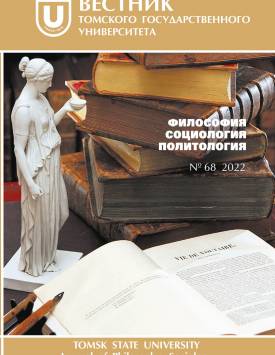Humanism in the lab: A view from the present
The article deals with individual factors of the functioning of science and scientific knowledge on their internal and external contours. As a working hypothesis, we put forward the thesis that science has a specific sociality, which is based on (1) a certain type of humanism common among researchers, and (2) localized in a special space - the space of a research laboratory. During the formation of modern science, it was these two factors that shaped science, firstly, as a system of values, the main purpose of which was and remains the search for truth, and secondly, as a social structure, the organization of which must satisfy the desired ideal. The transformation of these basic factors of the functioning of science in the modern world leads not only to the emergence of new actors in the scientific space, but also to the need to revise the classic forms of functioning and interaction of the scientific community both within itself and with non-scientific institutions. A scientific laboratory is one of the meeting places and intersections of the external and internal contours of science. Scientific research takes place in it, but it also forms the infrastructure necessary for the society to use their results. On the one hand, it spreads scientific values beyond scientific institutions, and on the other hand, it reassembles scientific practices so that they can either exist outside the walls of laboratories. Therefore, both for the social and cognitive contexts of the consideration of science, the laboratory has a special status. It not only forms the values and image of the scientist inside and outside the scientific community, but also becomes a key element in the social structure of the production and dissemination of knowledge.In modern conditions, the laboratory has another specific feature. It can no longer be viewed simply as a specific location. Rather, we can talk about its distributed nature. It includes various departments responsible for the creation of equipment or software associated with interaction with scientific and non-scientific actors. It breaks up into many connections and relationships that require the efforts of its participants to maintain. As a result, the distributed nature of the laboratory allows maintaining in the social system a set of values associated with openness to new things and the ability to introduce scientific achievements into social life. The authors declare no conflicts of interests.
Keywords
philosophy of science, science, humanism, laboratory, scientific ethos, organization of scienceAuthors
| Name | Organization | |
| Maslanov Evgeniy V. | Inter-regional non-government organization Russian Society for History and Philosophy of Science | evgenmas@rambler.ru |
| Sokolova Tatiana D. | Inter-regional non-government organization Russian Society for History and Philosophy of Science | sokolovatd@gmail.com |
References

Humanism in the lab: A view from the present | Tomsk State University Journal of Philosophy, Sociology and Political Science. 2022. № 68. DOI: 10.17223/1998863X/68/21
